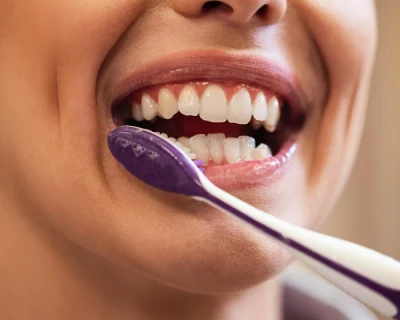Blog

Published on: 06/08/2025
Wisdom Teeth: Myths, Facts, and When to Consider Removal

This blog covers common myths and when wisdom tooth removal may be needed. Whether you’re curious or concerned, we’re here to help. Expect simple, reliable advice you can trust.
Quick Facts About Wisdom Teeth
What are wisdom teeth?
Wisdom teeth are the third set of molars. They usually grow at the very back of your mouth—two on top and two on the bottom. They’re referred to as “wisdom” teeth because they appear later, between the ages of 17 and 25.
Most people get their wisdom teeth in their late teens or early 20s. The exact timing can vary from person to person. Some get them early or late, while others may not develop them at all.
Today’s smaller jaw sizes often don’t have enough room to fit extra molars. When there’s not enough space, wisdom teeth may cause crowding, discomfort, infections, or become impacted—often requiring removal. While some people develop all four, others may have only one, two, or none at all.
Myth 1 – Everyone Has Wisdom Teeth
Fact:
Not everyone develops wisdom teeth, and that’s completely normal. Genetics largely decide whether you grow all four, some, or none. Studies show that around 20% of people never develop all four wisdom teeth.
Some people have fewer than four, while others have none at all. This natural variation is influenced by your genes and even the size of your jaw.
If your wisdom teeth haven’t appeared, a dental X-ray can check for them. It shows if the teeth are present, developing, or missing below the gumline. It shows if the teeth are present, developing, or missing below the gumline. This helps with planning and deciding if wisdom tooth removal may be needed later.
Myth 2 – Wisdom Teeth Always Need Removal
Fact:
Not all wisdom teeth require removal. Although it’s common to have your wisdom teeth removed, it’s not always the case. Your particular situation determines if removal will be necessary.
Wisdom teeth must be removed if they’re impacted or covered by gum. They can also push other teeth, cause decay, or infection. Impacted wisdom teeth hurt adjacent teeth, gums, and jawbone or create cysts. Wisdom tooth extraction in these situations prevents future issues.
You may not need them to be removed if your wisdom teeth are healthy and well-aligned. If they don’t cause pain, infection, or damage, they can stay untouched. Most individuals have their wisdom teeth throughout their entire life without any issues. A dental check-up will make them trouble-free.
Regular check-ups allow monitoring of where and how healthy your wisdom teeth are. X-rays detect hidden issues early on, which will determine if and when you will need your wisdom teeth removed. Early detection at routine check-ups catches the issues before damage and pain can set in. This assists you in making smart choices about your mouth.
Myth 3 – Wisdom Teeth Have No Function
Fact:
Wisdom teeth did have a function. Our ancestors were larger-jawed and had to subsist on a coarse, fibrous diet. They were designed to eat hard foods such as roots, nuts, and raw meat.
Modern milder diets and reduced jaws result in wisdom teeth frequently not being able to fit correctly. This narrow space is able to cause crowding or impaction. Wisdom teeth can serve as regular molars if they erupt straight and healthy.
Whether or not they need to be removed depends on your anatomy. A dentist is able to analyse their location and condition through regular check-ups and X-rays. If there’s no pain, damage, or infection, wisdom tooth extraction is unnecessary.
Myth 4 – Wisdom Teeth Always Cause Pain
Fact:
Wisdom teeth don’t always cause pain. Many people have wisdom teeth that come through without any discomfort or issues. With enough space, straight wisdom teeth can erupt and work normally.
Pain generally implies that something is wrong with your wisdom teeth. Ache can result from impaction, infection, or pressure from adjacent teeth. The conditions will most likely result in swelling, jaw stiffness, and not being able to chew. They generally demand the removal of wisdom teeth.
Even without pain, routine dental examinations of wisdom teeth are necessary. X-rays may aid in keeping track of your wisdom teeth’s growth and location. They detect problems early, before pain or damage starts.
Myth 5 – Wisdom Tooth Removal Is Extremely Painful
Fact:
Most people fear that having wisdom teeth removed will hurt a lot. Through the advanced dental technology they will use, the process has reduced the pain. Dentists now possess better tools and streamlined process protocols to reduce the pain.
Local anaesthesia and sedation relax and pain-free you when the extraction pain-free. You may feel a little pressure but no pain during tooth extraction.
What to Expect During and After Surgery:
- The procedure is usually quick and done in one visit.
- Local anesthetic or sedation is employed to make you calm.
- You can feel pressure but not pain while it is being extracted.
- Some mild bruising, swelling, or tenderness is possible for a few days.
- Your dentist will give you aftercare advice and pain relief options.
Tips for a Smooth Recovery:
- Rest for the first 24–48 hours after surgery.
- Follow all post-surgery instructions given by your dentist.
- Avoid hard, crunchy, or hot foods for a few days.
- Keep it clean by saltwater rinsing.
- Don’t smoke or drink with straws because they will disrupt healing.
- Use cold packs as needed to minimise swelling.
- Use pain medication as indicated.
- Most people heal fully within 7 days.
Myth 6 – Delaying Removal Has No Risks
Fact:
Delaying wisdom tooth removal may seem fine if there’s no pain. But it can lead to serious problems later on.
Potential complications include:
Tooth decay
Brushing wisdom teeth properly is hard, increasing the risk of cavities. Without careful cleaning, cavities are more likely to form on these hard-to-reach teeth over time.
Gum disease
Food and bacteria easily get trapped around the wisdom teeth and lead to gum disease. This buildup usually leads to inflammation, redness, and painful gum infection near the teeth.
Crowding
Wisdom teeth also tend to push other teeth, causing them to misalignment. The pressure crowds your teeth and changes the alignment of your teeth.
Infections
Partial eruption of wisdom teeth creates small spaces where bacteria can easily build up and multiply. The spaces can lead to infections and inflammation of the gums if not treated.
Cysts
Cysts can form around impacted wisdom teeth, damaging nearby areas. The cysts can damage your jawbone and other healthy teeth around them if left untreated.
Visits to the dentist and X-rays catch problems before pain or damage begins. Your dentist can advise when to get wisdom teeth removed. Removing them early makes it easier and healing faster.
Myth 7 – If They’re Not Bothering You, They’re Fine
Fact:
Just because your wisdom teeth aren’t causing pain doesn’t mean everything is fine. Many issues develop silently and can go unnoticed until they become serious.
Silent problems may include:
Infections
Partially erupted wisdom teeth trap food, causing infections and swelling. These infections can damage gums and create ongoing discomfort if not treated promptly.
Bone loss
Impacted wisdom teeth can put pressure on the jawbone, causing damage over time. This pressure may lead to bone loss around the teeth, weakening the jaw structure.
Damage to nearby teeth
As wisdom teeth grow, they can press against nearby molars, leading to discomfort or harm. This force might also alter tooth alignment and disrupt your bite.
Regular checkups are important to catch these problems in an early phase. Even without any pain, regular visits are required. X-rays allow your dentist to keep an eye on your wisdom teeth position and condition.
Winning Smiles Dental Surgery monitors the wisdom teeth closely and provides personalised guidance. In case of removal, we will take you through a secure, hassle-free process.
 How to Know If You Need Wisdom Teeth Removed
How to Know If You Need Wisdom Teeth Removed
Not sure if you need your wisdom teeth out? Here are some key symptoms that may indicate a problem:
Signs you might need removal:
- Pain or tenderness at the back of your mouth
- Puffy or bleeding gums around your wisdom teeth
- Jaw rigidity or trouble opening your mouth
- Bad breath or foul taste that does not disappear
- Crowding or shifting of nearby teeth
- Repeated infections or cysts in the area
Your dentist will examine your wisdom teeth with a clinical exam and X-rays. They’ll evaluate for impaction, infection, and harm to the adjacent teeth. They’ll determine if there is sufficient space for your wisdom teeth to come in without risking injury.
If you experience any of these, then it’s advisable to visit your dentist. Even without symptoms, a visit is sensible if it has been a long time since the last visit. Early visits prevent issues and facilitate the removal of wisdom teeth if they are required.
Wisdom Teeth Removal at Winning Smiles Dental Surgery
Winning Smiles Dental Surgery knows that extracting wisdom teeth can be stressful, but not necessarily so. Our cautious hands make the process easy and smooth.
With compassion and expertise, we develop treatment plans unique to your case. Bruised, affected, or merely in need of a watchful eye, we’ll walk you through it.
Our state-of-the-art technology enables us to extract and check wisdom teeth safely and comfortably. We also offer sedation options to help you feel relaxed throughout the procedure.
In Blacktown and Denham Court, we offer expert care for your wisdom teeth. Schedule your appointment now—we’re here to help you maintain a healthy, confident smile.
Final Thoughts – Trust the Facts, Not the Myths
Not all wisdom teeth are harmful, but doing nothing can lead to hidden problems. Pay attention to facts, not myths, and consult experts about wisdom tooth removal.
Early issues can be caught by indicating regular check-ups and X-rays, even when you don’t hurt. Our experienced dentist can help you make the best decision for your smile and good health.
Book a check-up of your wisdom teeth today at Winning Smiles Dental Surgery. It is an easy step to secure the well-being of your oral health.
FAQs
- Do all wisdom teeth need to be removed?
No, not all wisdom teeth require removal. If they’re healthy and not causing issues, they can stay. - How do I know if my wisdom teeth are impacted?
You may feel pain, swelling, or pressure at the back of your mouth. A dental X-ray can confirm if they’re impacted. - Is wisdom tooth extraction painful?
The procedure is done under local anaesthesia or sedation, so it isn’t painful. Some discomfort after surgery is normal and manageable. - What is the recovery time for wisdom tooth removal?
Most people recover in about 3 to 7 days. Following aftercare instructions helps speed up healing. - Can wisdom teeth cause headaches or jaw pain?
Impacted wisdom teeth can exert pressure on the jaw and surrounding nerves, often triggering jaw aches, tightness, or even headaches.

 How to Know If You Need Wisdom Teeth Removed
How to Know If You Need Wisdom Teeth Removed


